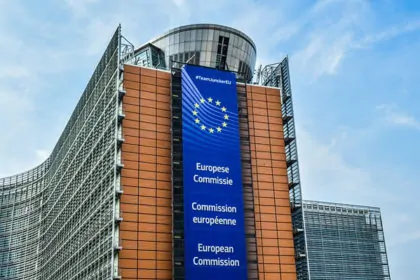The European Court confirms cartel of optical drive manufacturers today. The plaintiffs Sony, Hitachi, Toshiba and Quanta had pleaded errors in the interpretation of Art. 101 TFEU, which imposed millions of penalties on them in 2015.
The background: high antitrust fines in 2015
 Today’s judgments (EU:T:2019:522, EU:T:2019:514, EU:T:2019:519, EU:T:2019:517 and EU:T:2019:515) are part of a long process between eight optical drive manufacturers and the European Commission.
Today’s judgments (EU:T:2019:522, EU:T:2019:514, EU:T:2019:519, EU:T:2019:517 and EU:T:2019:515) are part of a long process between eight optical drive manufacturers and the European Commission.
In 2015, the European Commission considered it proven that the companies had colluded in an anti-competitive manner in tenders for optical drives for Dell and Hewlett Packard (HP) laptops and desktops. The European Commission therefore fined Philips, Lite-On and their joint ventures Philips & Lite-On Digital Solutions, Hitachi-LG Data Storage, Toshiba Samsung Storage Technology, Sony, Sony Optiarc and Quanta Storage millions of euros in 2015.
Interpretation of Article 101 TFEU
In its judgments today, the CJEU therefore dealt comprehensively with the interpretation of Art. 101 TFEU at the time. The plaintiffs – Sony, Hitachi, Toshiba and Quanta – allege in particular the following errors on the part of the EU Commission:
- The Commission lacked competence to apply Article 101 TFEU and Article 53 of the EEA Agreement
- Error in determining the size of the geographic market concerned
- contradictory or at least inadequate reasoning as to the legal classification of the alleged infringement
- Error in finding that trade between Member States was affected
- No uniform infringement
Jurisdiction and geographical scope of Article 101 TFEU
The European Court of Justice (CJEU, Court of First Instance) confirms that the Commission was right to conclude that the scope of the cartel covered the whole of the EEA. It is therefore also competent to apply Article 101 TFEU and Article 53 of the EEA Agreement. Although the conduct in the EEA is relevant for the purpose of determining the Commission’s jurisdiction, the geographical area covered by that conduct is determined by the conduct of the cartel and the functioning of the cartel.
The concept of a single and continuous infringement presupposes a complex of practices used by different parties to pursue a single anti-competitive economic objective, the CJEU ruled. It must therefore be held that there is no contradiction between the statement of objections and the contested decision if it is found in that decision that the single and continuous infringement consisted of several “individual infringements”.
Duty of the EU Commission to state reasons
The CJEU rejected the applicants’ argument that the Commission had failed to fulfil its obligation to state reasons by failing to state its reasons in the contested decision. The Commission is not obliged to highlight in its decision all the factual and legal issues which were dealt with during the administrative procedure and which it did not take into account when calculating the amount of the fine imposed, the Court clarified. On the contrary, Article 296 TFEU requires the Commission to set out the facts and considerations which, in the context of the decision, are essential to make clear to the competent court and the persons concerned the circumstances in which it has applied EU law.
According to the Court, the Commission clearly and unambiguously explained the scope and nature of the applicants’ conduct, which it considered to constitute an infringement of Article 101 TFEU, and the evidence on which those conclusions were based. The Commission had clearly stated that the contacts were individual infringements and at the same time fulfilled the criteria for a single and continuous infringement.
The CJEU pointed out that an undertaking involved in one or more aspects cannot necessarily be held liable for the entire infringement. The Commission still had to conclude that that undertaking was aware of the anti-competitive activities of the other undertakings at European level or that it could reasonably have foreseen them. In the present case, this had to be taken into account only in assessing the gravity of the infringement and in fixing the amount of the fine.
Calculation of the fine contested
In an additional plea, all the applicants claimed that errors had been made in the calculation of the fine and that insufficient reasons had been given for the calculation of the fines. Quanta’s complaint was a special case in this area: the EU Commission had complained about this and demanded that the fine be increased.
However, the Court rejected all the pleas concerning the fines – including the increase in the fine demanded by the EU Commission.
The Commission may, in two circumstances, depart from the general method for setting the amount of the fine:
- take into account the insolvency of an undertaking in accordance with point 35 of the guidelines
- wish to achieve deterrence in accordance with point 37 of the Guidelines
Sony had in particular opposed the multiplier of deterrence applied to them as well, since they had not participated in any bid or price agreement. The court rejected this. The size and overall resources of an undertaking are relevant criteria for a sufficient deterrent effect, the Court held. The participation of Sony in this exchange was no less frequent than that of the other addressees, the court clarified. The fact that other addressees may have had more bilateral contacts than the applicants in no way reduces the gravity of the infringement of the applicants.
The European Court therefore dismissed all actions brought by the manufacturers Sony, Hitachi, Toshiba and Quanta in today’s judgments.
Sources:
Urteil EuG EU:T:2019:515 – Sony Corporation , Urteil EuG EU:T:2019:517 – Sony Optiarc, Urteil EuG EU:T:2019:519 – Quanta Storage, Urteil EuG EU:T:2019:514 – Hitachi LG, Urteil EuG EU:T:2019:522 – Toshiba Samsung Storage Technology Corp.
Image:







Leave a Reply